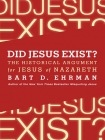Did Jesus Exist? - The Historical Argument for Jesus of Nazareth by Bart Ehrman (ebook reader browser .TXT) 📗

- Author: Bart Ehrman
Book online «Did Jesus Exist? - The Historical Argument for Jesus of Nazareth by Bart Ehrman (ebook reader browser .TXT) 📗». Author Bart Ehrman
Irrelevancies in Historical Argument
ANYONE WHO SPENDS MUCH time dealing with controversial historical issues knows full well that many arguments are simply irrelevant. Just to give an example from the nonmythicist camp—in fact, from the opposite end of the spectrum: it is frequently argued by fundamentalist and conservative evangelical apologists for the Bible that since the New Testament is more frequently attested in ancient sources than any other book from antiquity, it can therefore be trusted. This argument, I’m afraid, contains a non sequitur. It is true that we have far more manuscripts for the books of the New Testament than for Homer, Plato, Aristotle, Euripides, Cicero, Marcus Aurelius—name your ancient author. But that has absolutely no bearing on the question of whether the New Testament books can be trusted. It is relevant only to the question of whether we can know what the New Testament books originally said.
Look at it this way. Both Das Kapital by Karl Marx and Mein Kampf by Adolf Hitler are better attested than, say, the New Testament Gospel of John. Far better attested. There is no comparison. We have far, far more copies of each that were produced closer to the time of the originals than we do for any of the books of the New Testament, including John. Does the fact that both books are extremely well attested have any bearing on whether you can trust what either one has to say? Are the author’s opinions therefore reliable? Are his teachings to be followed simply because we have a lot of copies of his work? The same applies to the Gospel of John or any other book of the New Testament. The fact that we have more copies of John than of, say, Plato’s Republic has no bearing on whether we can trust it more or not. It only has a bearing on the question of whether we can reasonably think that we know what the author originally wrote. Whether what he wrote is right or not has to be judged on other grounds.
Fundamentalists and conservative evangelical Christians are not the only ones who make irrelevant arguments to score points with the reading public. So too—to return to our original side of the spectrum—do mythicists. In this chapter I will consider several arguments typically made by mythicists in their effort to show that Jesus did not exist. My thesis is that most of these points are weak and some are irrelevant to the question.
Claim 1: The Gospels Are Highly Problematic as Historical Sources
MYTHICISTS SOMETIMES LIKE TO revel in the historical problems posed by the Gospels: we do not have the original texts of the Gospels, and there are places where we do not know what the authors originally said; the Gospels are not authored by the persons named in their titles (Matthew, Mark, Luke, and John) but were written by people who were not followers of Jesus living forty to sixty years later in different parts of the world; the Gospels are full of discrepancies and contradictions; and the Gospels report historical events that can be shown not to have happened.
Some scholars may disagree with some of these claims—conservative evangelicals will disagree with all of them—but I personally think they are absolutely right. And I think that these issues create genuine problems for the study of the New Testament, the history of the early Christian church, and the life of the historical Jesus. But I also think they are for the most part irrelevant to the question of whether or not there was a historical Jesus, for reasons I will explain. But first it is important to delve into the issues a bit.
We Do Not Have the Original Texts of the Gospels
To begin with, even though the Gospels are among the best attested books from the ancient world, we are regrettably hindered in knowing what the authors of these books originally wrote. The problem is not that we are lacking manuscripts. We have thousands of manuscripts. The problem is that none of these manuscripts is the original copy produced by the author (this is true for all four Gospels—in fact, for every book of the New Testament). Moreover, most of these manuscripts were made over a thousand years after the original copies, none of them is close to the time of the originals—within, say, ten or twenty years—and all of them contain certifiable mistakes.
I do not need to explicate all these problems here, as I have written about them in more detail elsewhere.1 My point in this context is that for the question of whether or not Jesus existed, these problems are mostly irrelevant. The evidence for Jesus’s existence does not depend on having a manuscript tradition of his life and teachings that is perfectly in line with what the authors of the New Testament Gospels really wrote. Suppose, for example, that it is true that the famous story of Jesus and the woman taken in adultery was not originally part of the Gospel of John (the only Gospel in which the story occurs) even though it is found in the vast majority of manuscripts produced in the Middle Ages. What does that tell us? It tells us that the story was probably not originally in John; in turn, that probably means that it is not something that actually happened in the life of Jesus. But so what? That doesn’t mean Jesus didn’t live. It simply means this event never happened, as far as we can tell.
Think of an analogy. Suppose Barack Obama’s birth certificate turns out to have been altered away from what it really said. (I don’t believe it was, not for a second, but suppose it was.) What relevance would that have for the question of whether Barack Obama was born? One would probably want to look for other





Comments (0)